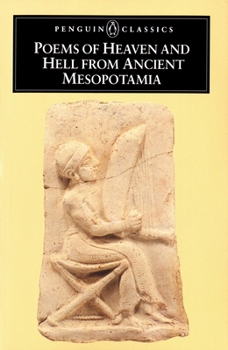Poems of Heaven and Hell from Ancient Mesopotamia
Select Format
Select Condition 
Book Overview
For more than seventy years, Penguin has been the leading publisher of classic literature in the English-speaking world. With more than 1,700 titles, Penguin Classics represents a global bookshelf of the best works throughout history and across genres and disciplines. Readers trust the series to provide authoritative texts enhanced by introductions and notes by distinguished scholars and contemporary authors, as well as up-to-date translations by...
Format:Paperback
Language:English
ISBN:0140442499
ISBN13:9780140442496
Release Date:June 1971
Publisher:Penguin Publishing Group
Length:192 Pages
Weight:0.35 lbs.
Dimensions:0.5" x 5.2" x 7.8"
Customer Reviews
3 ratings
useful source material
Published by Thriftbooks.com User , 17 years ago
Composed of two of the longer and most interesting ancient Mesopotamian epics, I found much material here to mine for my own recent compilation of inscriptions: Wetlands of Mass Destruction: Ancient Presage for Contemporary Ecocide in Southern Iraq.
Timeless
Published by Thriftbooks.com User , 19 years ago
This book contains mainly two poems: the Babylonian 'The Creation' and the impressive Sumerian 'Inanna's journey to hell'. Both texts are from the second millenium B.C. 'The Creation' is in fact a hymn of praise of the feats of Marduk (Son of the Sun), the Babylonian king of the gods. It contains however a 'creation of man' which shows strong religious reminiscences. Man is made of the stuff of a fallen god: 'they declared him guilty ... they cut his arteries and from this blood they created man'. Man is made to serve the gods and his burden is to labour forever. 'The Creation' is far less impressive than 'The Epic of Gilgamesh'. It is very 'regional', written for a local god. 'Gilgamesh' treats the general human search to be equal to the gods and attain immortality. It is also more beautifully written with magnigicent 'bis repetita placent's and hypnotizing cadenzas. 'The Creation' is a more 'clumsy' work. 'Inanna's journey to Hell' is certainly one of the highlights of world literature. Its mythological and human themes are timeless. Its influence goes from the Greek to 'Salome' of Oscar Wilde and Richard Strauss. Pregnant are the moanings of the queen of Hell, Erishkigal, faking childbirth, because she is surrounded by men who 'bring to a woman's body no sweet satiety, nor fondle the happy children'. Or, Inanna's stripping to nakedness to take the cloths of the death. As N.K. Sandars in her excellent introduction, as well as Prof. N. Kramer in his book 'The Sumerians' indicate: Inanna goes to Hell to take the place of Ershkigal and resurrect the death (e.g. her husband Dumuzi). This book is a must read for all those interested in the highlights of world literature.
An interesting collection
Published by Thriftbooks.com User , 23 years ago
The bulk of this book consists of the Babylonian creation myth, and the Sumerian myth of the Descent of Inanna. There are also several smaller poems, including an invocation to "the Gods of Night." I came across this book in a used bookstore, and snapped it up--I am an incorrigible mythology buff, and it's not every day you find a collection of primary sources like this one.The Babylonian creation myth is the story of the hero-god Marduk's defeat of the chaos goddess Tiamat. Sandars explains that the myth covers an older layer--the remnants of the time in which the Goddess was supreme and complex, and in which there were many more gods, their powers later being assimilated into the figure of Marduk.The Descent of Inanna details that goddess's journey into the underworld, where she is killed and held prisoner by her sister, the death-goddess Ereshkigal, and is finally rescued by Enki, who sends two spirits to console Ereshkigal in the pains of childbirth. As a reward, she gives them Inanna as a gift, and the goddess of life is restored to the upper world. The idea of the death goddess giving birth as Inanna is revived is an evocative image--is it Inanna who is being born here? Echoes of the later Eleusinian mysteries, in which Persephone was said to give birth in the underworld. Food for thought. The legend also includes several similar accounts of the capture of Dumuzi, Inanna's husband, who is forced to take Inanna's place in hell.A fascinating hodgepodge, this book has a place of honor on my shelf.






